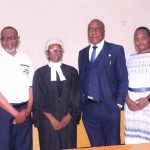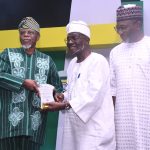…..Reiterates Council’s Commitment To Stricter Digital Media Platforms Monitoring
The Advertising Regulatory Council of Nigeria (ARCON) has said the recent Federal High Court judgement has upheld the constitutionality and legality of ARCON law in regulating Advertising, Advertisement and Marketing Communication in Nigeria.
This was stated by the Director General of ARCON, Dr. Olalekan Fadolapo during a media parley held at ARCON office in Iganmu, Lagos.
According to him, the ARCON law is not in conflict with freedom of speech as stated in some quarters but a call to action and the ability to sanctify the advertising sector. “Advertising speaks to the practice, advertisement speaks to the activity and the law empowers us to regulate the practice and the business activities; and this is situated within the marketing communication.
“Advertising is a national profession, trade activity is also national in nature. Now considering the issue of freedom of speech, freedom of speech is not absolute, it has restrictions. Freedom of speech has its own borderlines that must not be crossed. Advertising is a commercial communication and has little or nothing to do with freedom of speech.
“So the constitutionality and the legality of ARCON law has been upheld. It does not conflict with freedom of speech,” he said.
He explained that the Council lost cases in the past because of the APCON law which was Advertising Practitioners Council of Nigeria; and that law states that this law shall apply to advertising practitioners; so the court held that since that law applies to advertising practitioners and that is the title, everything inside it must relate to advertising, that was why the Council lost these cases.
“But now it is Advertising Regulatory Council of Nigeria (ARCON) which has taken away the person, but now includes the person and the activity,” he added.
He continued: “Another thing that the judgement also upheld is the proclamation of ARCON and the power to enact bye laws. As at today, we have three pronouncements, the first one is the Proclamation, the second one is the Code the third one is Advertising Industry Standards of Practice (AISOP).
“The proclamation started the licensing regime and that was where every agency or organization have to start the license, the second is the Code and the third one is the most recent one which is AISOP which have the payment thresholds which is at today in Nigeria is 45 days, disengagement protocol; which states that before you disengage an agency, pay them and move your account to the next.
“The AISOP is also the one saying that there must be a procedure for agency engagement; they are also the ones talking about copyright; if you do a presentation to a client and the client decides to go and use your copyright, then that is at a violation and an infringement.
“The court held that ARCON has a right to make pronouncement as it relates to advertising, advertisement and marketing communications, which further validates all the pronouncements and bye-laws that ARCON have.
“For example, the law defines advertising, advertisement, marketing communication and also medium. So for us, what is the judgement speaking to? one, the court held that in terms of that particular law and legality of that law, the constitution empowers the National Assembly to promulgate law on professional practices.
“Secondly, the Law also gives the National Assembly exclusive power to determine trade and trading activities. Now, if you look at our law, our law says that there shall be a council for the regulation and control of advertising, advertisement and marketing communication. Both literal meaning and contextual meaning, advertising and advertisement are different terms.
“Don’t forget that it is not easy to amend law. The APCON law was enacted in 1989, before we were able to get it changed in 2022. So you can imagine how many years that has taken. So, we need to cover our scope as much as possible and you know that between that time and now, so many things have changed and will continue to change.
“Four years ago, there was no AI, three years ago, there was no AI; nobody knows the technology that will drive this industry next year, we can only speak of today. So, the judgement states that the law that established ARCON gives it power to regulate the profession, in line with the National Assembly’s power.
The DG explained further that the recent judgement is omnibus to the Council as it covers almost all the areas that had given concern to the Council and advertising in Nigeria, adding that 90% of the judgement is in ARCON’s favour.
On the remaining 10 percent of the judgement, he said the judge had ruled that ARCON should not fine violators but ask them to come and regularize their adverts and pay a regularization fee but rather the Advertising Offence Tribunal will impose the fines.
He however added that it is of note that almost all the cases ARCON has in court are in the same pattern in which they are testing the legality of ARCON vis-à-vis the constitution.
“I must say the law is not in conflict with the constitution; it is open here that the law has complied with the requirements of the constitution. The body is legally and legitimately established by the National Assembly and also the other area on social media.
“You know before now that what we have is e-commerce but now everything has moved from e-commerce to a full digital economy. In fact, what happens in the digital space is far more tensed and we cannot leave that space. So the judgement has held that Advertising Regulatory Council of Nigeria’s Regulation is purposeful and very necessary as its role is necessary in controlling the integrity and accuracy of advertisements especially in the age of misleading digital content.”
The judgement also states that advertisement on Instagram to Nigerians, owners of the account also has a duty to follow the law and cannot cherry-pick their regulators.”
It states further that: ARCON’s mandate is to protect the public, regulate commercial message meant for Nigeria market and ensure that advertising no matter the platform meets national standards and to exempt is without justification and it will open the floodgates to unchecked influence on the Nigerian market.
It should be recalled that ARCON got the judgement at the Federal High Court of Nigeria in Lagos Judiciary Division on Tuesday, 29th April, 2025.
Speaking further on the monitoring of digital contents, the DG said monitoring digital media cannot be done with phone hence the Federal Government is working on improving the Council in terms of infrastructure and acquisition of software.
He emphasized the complexity of tracking content online, particularly when dealing with primary and secondary digital media holders. “We’re already in discussions with primary digital media owners, the tech companies and we hope to reach a conclusion soon,” he said.
“Also, our staff will be exposed to both local and international training. But as it stands now, we have the wherewithal to do our jobs because if not, all these things we are showing you won’t be possible.
Fadolapo stressed the importance of public participation in maintaining standards, stressing that advertising regulation is a collective responsibility. “We’ve had industry stakeholders alerting us to non-compliant ads. That’s the kind of vigilance we need,” he said.
Speaking on the level of compliance to AISOP, Dr. Fadolapo disclosed that compliance rate is 75 percent, adding that despite the high compliance rate, the remaining 25 percent is still important to ARCON and the Council will be all out on violators.
On the Governing Council for ARCON, the DG said the Federal Government is working assiduously on the appointment of a Governing Council but pointed out that the absence of a Governing Council is not an excuse for ARCON not to work.
He explained that there are two structures that the law puts in place, “one of it is that the minister will give a specific or general directive to ARCON; we also have a management in place. Beyond the two, I relate with the Heads of Advertising Sectorial Group (HASG) and that is why anytime we are setting up a committee, you will always see a representation in all the committees.”
BV.












